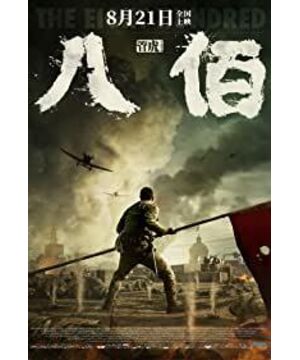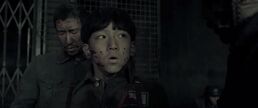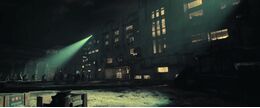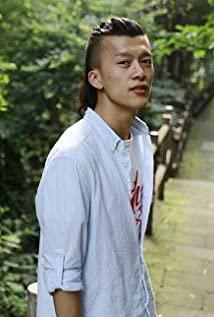As soon as the theater was over, because the feeling of embarrassment was really lingering, I couldn't help but complain, and friends who didn't agree with it can be right as nonsense. It is stated in advance that all complaints are only aimed at the film itself, and do not raise politics, history and heroism.
Except for a few excellent works, it seems that most of the domestic war films will go into the embarrassing mode of "shouting slogans". I can't wait to type the words patriotism education on the screen, and continue the entertainment circle of "Founding an Army". Actors go into battle mode. "Eight Hundred" opens with red letters on a black background: "When I become dust, you will see my smile." When it hit the screen, my heart skipped a beat, and I smelled a little "contrived" . Maybe it's because the war movies I've watched recently are of a relatively high standard, so when I stepped into the theater, I still had an expectation that "Eight Hundred" would be a movie that could tap into the soul and tap into human nature. However, the more I looked back, the more pretentious and embarrassing it became. In the end, I actually felt a sense of guilt . I felt guilty about why such a heroic scene. My lacrimal glands were indifferent, and I even wanted to laugh a little embarrassedly. The following is a simple list of points that may be the plot design that caused me to buckle my toes. There may be places where I didn't pay attention to the plot. I don't remember some details clearly, sorry.
The first is the role of the people in the concession. When the charming Belarusian geisha sang into the painting, my first reaction was the Italian girl singing in "Porcelain Pig". The war is mixed with poignant beauty and romance . I am full of expectations for this design, thinking about how it will be integrated in the future. The plot used this character to set off the atmosphere and emotions, but the scene behind the Belarusian beauty only had the sentence "My father is Chinese". Except for the first two sentences, she never opened her voice again. The indignant expression of the deputy anti-Japanese female fighter, the charm of the character was not fully utilized .
The heroine Yang Huimin (played by Tang Yixin) gave an expression shot at the beginning. I thought she would analyze her inner world, but she turned out to be a tool person. This kind of tool person is not only set by her. Almost all the people on the other side of the river are tool people. There is no past, no psychological description, only actions. Do you think this can understand the behavior of the characters? Yes, but it is blunt, and there is no substitution. feel. Maybe the director wanted to show a group portrait - people from all walks of life are worrying and contributing to this battle, but this kind of unfocused setting is simply unnecessary. Especially the plot of the casino owner's brother who suddenly became emotional and died heroically, even if he did a little bit of "closing the casino door" in the early stage to show the change in his thinking, but it was too little, not enough, and the arc of the characters was weak. People burn their brains.
There is also the setting of the crowd watching the battle by the river. Although I haven't had time to check the historical facts, I don't know what the actual situation is, but I am very curious that the people in the concession do not seem to be afraid of death. When the shells came, the bombers came, and even the Japanese fed the guns to the civilians in the concession, everyone ran around symbolically, and then still stubbornly watched the battle. This is not in line with common sense, even if it is to show that "the masses are being awakened", but all anti-human things, whether it is justice or evil, are not true, and the strong atmosphere of education can only make people feel embarrassed and speechless ( really speechless). There is also the last scene of crossing the bridge. The crowd stretched their hands out of the iron bars, making fists or beckoning. It doesn't matter. The most unbearable thing is that a little girl even gave a thumbs up. If I remember correctly, She also performed a military salute before. With such a fierce fight and gunshots everywhere, if it is a child, the big bottom will be petrified. Even if such a brave and patriotic child is not ruled out, the plot designed in the movie is full of traces of deliberate flattery. A red scarf.
The second one is the role of the eight hundred warriors. The transformation of Dragon Boat Festival (Ou Hao) is sudden, from a cowardly rural boy to a heroic and dedicated warrior. The film does arrange the process of transformation, but it is basically driven by the outside (the crowd cheers, the head of the group encourages), the motives of the characters themselves are not obvious, and the relationship between him and his younger brother, Xiaohubei, is basically maintained by the lines, and the two brothers’ friendship. The interaction is not as much as that of Xiaohubei and Xiaoqiyue, and there is not even Xiaohubei and Maduo. In short, the production team took all the plot points into consideration, and also gave a way to promote it, but they didn't give it in place.
The sublimation link in the second half really broke down. It completely gives people the feeling of reading a middle school history textbook, and its bluntness even drowns out the only remaining sense of authenticity of Jiang Wu and Wang Qianyuan (sorry for forgetting their names). When the upper management of the Kuomintang persuaded Head Xie to retreat, he mentioned show, performance, life, and historical process. If further extension is made there, it may be possible to deepen the thinking of war to a deeper level. However, the film is unadorned or even rudely in line with the history textbook, or it is not as deep as the history textbook, bypassing the problem points and forcibly sublimating. As a result, when the Yao Hundred Warriors charged on the screen, I tried my best to tell myself that they were great, and I didn't shed a single tear (my tears were very low). The film didn't make me feel proud or heartfelt shudder and excitement, just embarrassment and guilt for not being able to cry for them in theaters.
The above are all the places that I personally think are flawed in the setting of the plot. Of course, this film also has many excellent points, such as the large-scale production of large scenes, which have been done very well in recent domestic war films, because many people will praise, Then I do not talk about it. In addition, my complaints are not combined with the current ZZ environment, and I am not clear about the review and deletion issues faced by the main creative team, so this is an amateur's pure complaints about the version that has been screened. Everyone seeks common ground while reserving differences . , rational communication.
View more about The Eight Hundred reviews










